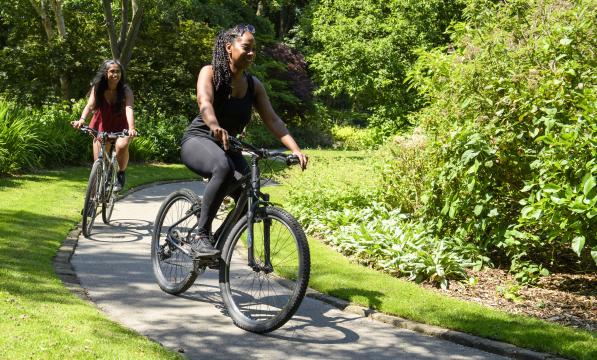Why we’re proud to support women’s cycling

The facts are stark and indisputable: women cycle less than men in the UK.
Much less.
They make fewer trips by bike and cover far fewer miles.
And that’s why at Cycling UK we’re doing everything in our power to make cycling more appealing to women.
Through the month of July, we run the Women’s Festival of Cycling, a celebration that recognises those raising the profile of women who cycle, while aiming to show the appeal of riding a bike and debunk the myths that cycling is somehow inherently dangerous or impractical.
Are we going to apologise for that?
Absolutely not.
Women make up 50% of the population and yet cycle a quarter of the miles of men.
That’s inequality for you.
So when we’re challenged about why we’re not highlighting male cycling, it’s frustrating that we have to justify it.
Cycling in the UK is dominated by men. The vast majority of cycle journeys are made by men.
Anecdotal evidence suggests it. Official statistics prove it
And you only have to head to your nearest cycle shop to see the vast range of bikes and clothing tailored for men and compare it to the limited options for women.
Our Women’s Festival of Cycling empowers women to cycle.
Men do not require the same level of intervention.
Women make up 50% of the population and yet cycle a quarter of the miles of men
Paul Tuohy, Cycling UK chief executive
The reasons behind this inequality were laid bare in a recent survey carried out by Cycling UK.
Our poll told us that 27% of women who were infrequent cyclists or who never cycled could be persuaded to cycle more by better infrastructure. A further 21% said they would cycle more if drivers were more considerate.
This backs up previous research which shows women have a greater fear that cycling is dangerous.
The same survey revealed that 85% of women cycle either less than once a month or never.
If you follow the natural logic, this could mean the next generation might miss out on one of life’s greatest pleasures.
If mothers think cycling is dangerous, they are unlikely to encourage their children – boys or girls – to cycle to school, or to ride at all.

But all is not lost. We just have to look to Europe to see that it doesn’t have to be this way.
Dutch, German and Danish women cycle as often as men. In fact, in the Netherlands, women make 55% of all cycling trips.
We can redress this imbalance in the UK, but men need to play a part.
We know women are more likely to try riding a bike if they are supported by someone they know, a husband, boyfriend, father, brother, colleague or friend.
But why should we?
Because, ultimately, we want to see a million more people cycling whatever their age, sex, colour or background.
It’s just that some people need a greater boost to hop on their bikes than others.










